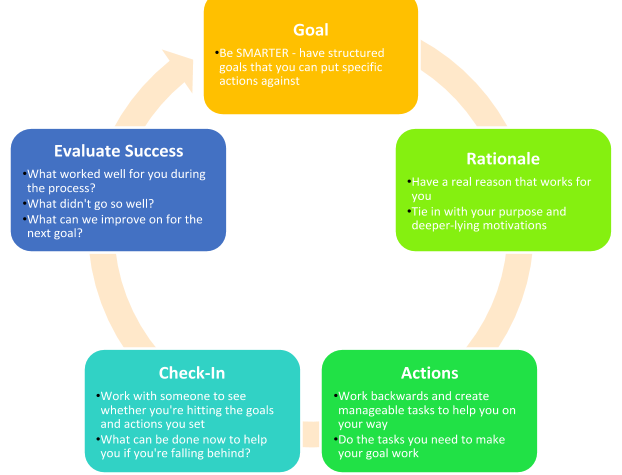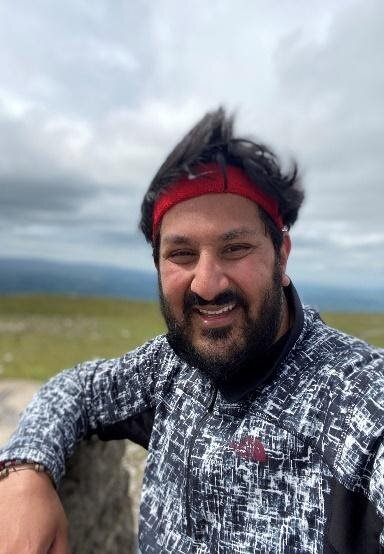Setting Goals – And Why You Should Do This RIGHT NOW
As a performance coach, having done several hundred coaching sessions with people all the way from new starters to senior managers, the key outcome I want coaches to take away from those sessions is to have goals to work towards. Seeing people hit their objectives is something that I really get a kick out of, because they are looking to make steps forward in their life, and I love that I had a hand in doing that.
My aim is to help give a few hints and tips to really help you on your way to setting the right goals that will work for you. These tips are designed to give you:
Motivation to understand why setting goals are good for you – especially in periods of turmoil
Give you some frameworks to get you on the way to setting your goals (and achieving them)
Identify the challenges you might face and how to mitigate those to help you achieve your goals.
Why goals are important – especially during the more difficult times
Goals are important – everyone needs to have them, right? In some small way, we judge our lives based on the goals we have achieve – both in our professional and personal lives. Andrew Carnegie says it well in the quote above, but goals are the most effective way of being able to give yourself:
Focus
Motivation
Productivity (not procrastination)
Measuring progress (and patting yourself on the back for achieving)
Something to strive towards
Taking control of things
I don’t know about you, but I reckon I have been subtly looking for goals to achieve in lockdown – I’ve started walking to get a bit healthier, both physically and mentally, and have been giving myself a few goals to make the walking really mean something to me… to the point where I was able to complete a walking endurance challenge by doing the Yorkshire Three Peaks in June this year, after having not walked BC (Before COVID).
The goal I set in early May was simple – I wanted to get fit enough to be able to do the Yorkshire Three Peaks challenge by June 20th 2020. I then had to work backwards from that and work out the steps I needed to take to make this happen:
the miles I would need under my belt to make sure the 26 miles was ok to do,
the hills I would have to climb to make the 5000 ft climbs needed
the challenges I have (mainly some dodgy knees and other potential injuries I could sustain) and how to mitigate these risks
If you are on furlough, been made redundant or simply looking at evaluating your career, right now is the perfect time to set yourself some meaningful goals for your career and personal life.
Self-reflection is so important, but we don’t usually get time to do just that… until COVID hit. However, what this time has allowed me to do is the following:
Having lost all focus and motivation to the point where I didn’t see the point of waking up in the morning. My goal to lose weight started to give me that reason to wake up and do something;
Take back control of things – the walking goal allowed me to have some control over what I was doing and how I was going to do it, which eased some of the anxiety I was getting
I used apps to track my progress and feel a real sense of achievement when I walked a little further, higher or quicker;
The knowledge that I was going to be proud to achieve this goal;
Become a bit more mentally resilient – it’s been a horrid time, but doing something positive about it really gets your endorphins going!
What Frameworks Can You Put In Place To Make Goal-Setting Work For You?
You need to make more sense of the WHY before the HOW
We all can (and do) set goals for ourselves – the best example of this is usually after a heavy New Year’s Eve when you tell your friends and family that you are going to make a resolution for the year ahead. However, we’ve not really thought much about why we are saying the words we are. Have you really stopped to consider the real reasons you want to set this goal?
When we flippantly say “I want to lose weight” have we really stopped to consider why?
I know what you’re going to say – surely it should be obvious – losing weight is good for you, and of course it is, but it’s really got to resonate with you before you are going to be truly bought in. For me, I have always known that I need to lose weight, but it took being severely ill with COVID symptoms and realise the impact on things like my breathing and heart rate to really make me take notice and look to make a goal to change my habits.
This made my initial goal of “I want to lose weight” into “I want to be fitter so that I live a longer, better-quality life to spend more time with those I love” which became more than just words – it had new meaning, and a deeper, more profound context that I was far more bought in to.
The same applies professionally. The important part is making sure you see the benefit of the goal you are making, and that it applies to your purpose and career – if you’re setting a professional target / goal on something that has little impact on how you operate in whatever role you do, you are not going to be bought in, and will ultimately not be too bothered whether you achieve your goal
There’s no such thing as too SMART – in fact, your goals could be SMARTER
Having talked about why we set them, the important thing is how we set them – take my initial goal for example:
“I want to walk to lose weight”
This is a great start, but there’s not much substance to it… this is where SMART goal-setting kicks in. The concept of SMART is around developing goals with the following facets:
S – Specificity – get involved in the detail –
M – Measurable – you need to be able to measure the extent of your success
A – Achievable – the goal must be achievable to begin with. If you cannot achieve your goal, you will never start the process
R - Relevant – Be real with yourself – is what you are looking to do relevant to your role, or what you are trying to achieve in the medium and longer terms (or vice-versa)?
T – Time-bound – without a timeframe, you’re just wishing things would work out for you.
George T. Doran reviewed SMART in 1981 and having looked at this framework in detail, he realised there could be additions to it – namely:
E – Evaluate – look back at the goal and see how effective you have been at achieving this.
R – Readjust – what changes and improvements can be made? This allows you to be brutally honest with yourself in self-reflection and set new goals or change the goalposts to either stretch you or be more achievable.
Using this framework allowed me to develop a fully formed goal - “I want to walk to lose weight” soon became “I want to lose 2st by walking for 2 hours a day, every day for 6 weeks” – that sounds so much more purposeful, right?? This allowed me to evaluate how I was doing every week and give myself a pat on the back or kick up the proverbial when I was falling behind on my walking time.
Don’t be afraid to involve other people in your goals
One of the best ways to really get some impetus (and a kick up the proverbial, if needed) is involving people you trust on a professional or personal level who can add value to making sure you hit your goals – my personal affliction is keeping the impetus going, and I know my wife is brilliant at doing the check-in part with me (even if I get annoyed with her checking in on me). Sharing your goals are a great way of not getting overwhelmed by the goal
It can literally be anyone – partner, work colleague, family member, friend, Performance Coach (ahem)… anyone who you know, deep down, wants to make sure you achieve your goals (and yes, your manager definitely wants to help you achieve your goals, as it helps their progress too – and don’t you forget it!)
My method for putting it all together – be GRACEful with your goals!
A method that I have used more recently to great effect (and really chuffed to call it my own) is the GRACE method – putting your goals, motivations and check-ins together to help you really create a framework for setting the goal and achieving it:
G – Goal – setting SMARTER goals that allow you to achieve your role. Start the process with someone you respect in your network and take some time to really make some meaningful goals;
R – Rationale – make sure the reason, your why, resonates with you and what you are looking to achieve. Reflect and really think WHY you are looking at this goal, and how this will help you on a deeper, more personal level of motivation that will spur you on;
A – Actions – working backwards from the end goal, what actions to do you need to do… take action and do them! Break the tasks down into small chunks that you can track – maybe even use a Trello board or Gantt Chart to help you with your tasks?
C – Check-In / Correct – make sure you check in with your goal and make sure you’re hitting it, or create new actions to correct your goal if you’re falling behind. Set yourself regular meetings with the person you helped set your goals with to see how you’re REALLY doing and be honest with yourself if it’s going poorly, or too easily;
E – Evaluate – if you succeed (or fail) in achieving your goal – look at the aspects that have worked well and what’s worked poorly, so that you can create goals that can really work for you. If it wasn’t a testing goal, you just aren’t doing it right!
This is all very well Bobby, but did you actually achieve your goal??
I talked at length about my goal to do the Yorkshire Three Peaks Challenge, and the one thing I missed was whether I actually did what I said (otherwise this blog would be pointless and hypothetical). I believe pictures tell a thousand words, so thought I’d just put these here:
I would love to know what goals you are looking to set for yourself – maybe I can help?
I hope my ramblings (pun not intended) give you some ideas about what to set goals on, and you can use some of these frameworks to help you make some key positive decisions about what you want to do in the future.
If you are thinking of setting some goals for yourself and you think I can help in any way, please feel free to connect with me on LinkedIn or drop me an email on bobby@bblearningsolutions.com.






